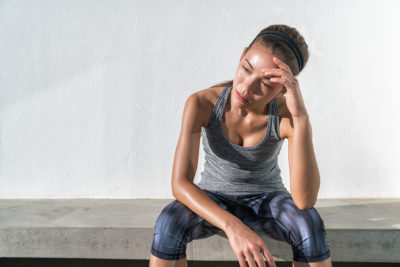World Health Day 2017 joins the fight in bringing awareness of one of the most common mental disorders of all time: Depression. Depression affects people of all ages, but statistics show that men and women ages 15 and 29 years of age are suffering from depression and are the least likely to seek help.
As defined by Mayo Clinic, depression is “a mood disorder that causes a persistent feeling of sadness and loss of interest”. Also called major depressive disorder or clinical depression, it affects how a person feels, thinks and behaves and can lead to a variety of emotional and physical problems.
Many people experiencing depression may have trouble doing normal day-to-day activities, and sometimes describe the feeling that life isn’t worth living. This is accompanied by the constant feeling of failure which leads to guilt. As a result, many people withdraw and give up on in many or most parts of life. Especially exercise!
Physical Symptoms of Depression Do Not Make Exercise Easier:
- Feeling tired all the time
- Not sleeping well
- Frequent body or headaches
- Dramatic changes in weight or appetite
Regular physical exercise alone will not cure depression, however, studies at the Mayo Clinic state, “Physical Exercise Will Ease the Pain and Suffering of Depression in a Number of Ways!”
- Releasing feel-good brain chemicals that may ease depression (neurotransmitters, endorphins and endocannabinoids)
- Reducing immune system chemicals that can worsen depression
- Increasing body temperature, which may have calming effects
Regular exercise has many psychological and emotional benefits, too. It can help you:
- Gain confidence
- Meeting exercise goals or challenges, even small ones, can boost your self-confidence
- Getting in shape can also make you feel better about your appearance
- Take your mind off worries
- Exercise is a distraction that can get you away from the cycle of negative thoughts that feed anxiety and depression
- Get more social interaction
- Exercise and physical activity may give you the chance to meet or socialize with others
- Just exchanging a friendly smile or greeting as you walk around your neighborhood can help your mood
- Cope in a healthy way
- Doing something positive to manage anxiety or depression is a healthy coping strategy
Trying to feel better by drinking alcohol, dwelling on how badly one feels, or hoping anxiety or depression will go away on its own can lead to worsening symptoms.
So, if you are enduring a life with depression, maybe all you need is to take a step forward in the right direction.Before starting a new exercise program, check with your doctor to make sure it’s safe for you. Talk to your doctor to find out which activities, how much exercise and what intensity level is OK for you. Your doctor will consider any medications you take and your health conditions. He or she may also have helpful advice about getting started and staying motivated.
If you exercise regularly but anxiety or depression symptoms still interfere with your daily living, see your doctor or other mental health provider. Exercise and physical activity are great ways to ease symptoms of anxiety or depression, but they aren’t a substitute for psychotherapy or medications.
So, if you or someone you know is suffering from depression, don’t ignore it any longer. Maybe a spin class, punching bag or walk in the park with your dog will help face depression head on!


